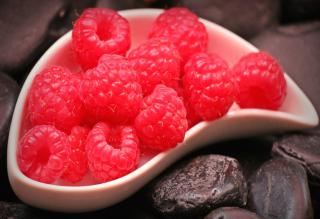

The Raspberry plant, or Rubus idaeus, is a cane-producing bushy shrub that produces the raspberry. Raspberry is a very beneficial fruit for our bodies.
Stems can grow taller than 6 ½ feet (2 meters) tall. Raspberry grows in the wild near the edges of forests – it’s name in French, “framboise”, come from the contraction of the words “fraise des bois”, forest strawberry – and in mountainous ranges across the world.
Soft and flesh raspberry fruits are very fragrant and many find them extremely palatable in desserts, jams, jellys and other sauces.
From a medicinal point of view, raspberry plants were once highly sought after. They have been cultivated since the end of the Middle Ages.
Raspberries grow in the wild in many countries, but it is especially due to the discovery of indeterminate raspberry species that cultivation became widespread in the ’50s.
 Raspberry leaves also have astringent properties, are very effective to deal with intestinal problems, in particular diarrhea.
Raspberry leaves also have astringent properties, are very effective to deal with intestinal problems, in particular diarrhea.Raspberry leaf infusion – 1 2/5ths to 1 4/5ths oz (40 to 50 g) leaves for 1 quart (1 liter) water. Let steep for 10 minutes. Drink 3 or 4 cups a day. Against diarrhea or before giving birth (drink from the 7th month).
Raspberry syrup – add the same weight in fruit juice and sugar, then boil to the desired thickness. This syrup is very refreshing in cases of febrile illness, and is also diuretic
Raspberry vinegar – delicious, this is prepared in the following manner: place fruits in a jar, and fill with white vinegar (about 1 quart (1 liter) vinegar for 3 ⅓ pounds (1.5 kg) fruits). Macerate for 10 days, filter. You can sweeten this syrup with sugar of honey. If you wish to prepare domestic raspberry liquor, replace the vinegar with clear brandy.
Raspberries like part sun or light sun, as well as slightly acidic soil, rather humus-rich, well-draining, neither too dry in summer nor too wet in winter.
Tips:
Plant your raspberry plant as hedges, along a wired fence. They will protect against intrusions thanks to their thorns, and still be appealing to neighbors thanks to their fruits.
Better not try to grow raspberries in pots. It would be very difficult, since raspberry plants send new canes up all the time…
– Gray mold – leads to whitish spots on fruits.
– Raspberry worms – a 1/10 inch (3 mm) flying insect that lays eggs in the flowers. Their larvae, tiny white worms, develop in the fruits.
– Aged plants – can be attacked by bacteria that produce cankers on their roots. Nothing can be done about this, you must pull the plant out…
– As for the rest… powdery mildew, aphids, desiccation, spots also can weaken raspberry bushes.
Eaten as is or sweetened with sugar, raspberries can be eaten raw. There are variations of juices, syrups, pastries, ice creams, jams or to flavor vinegar. Liquors and brandies are also produced from raspberries.
–>Raspberry nutritional content
38 kcal / 3.5 oz (100 g). Raspberry contains vitamin C (25 mg/100 g).
It has high levels of trace elements: iron (with 0.7 mg/ 3.5 oz (100 g), it is one of the highest), calcium, magnesium.
Raspberries are also fiber-rich, which improves intestinal transit.
Raspberry leaves are astringent, tonic, purgative and diuretic.
Organic acids contained in raspberries help regulate blood pH levels after exercising.
Are you looking for a refreshing alternative to tiramisu? Go for raspberry tiramisu! And for an original and light dessert, try raspberry clouds made from yogurt, egg whites, sugar and of course raspberries!
Blandine Merlin